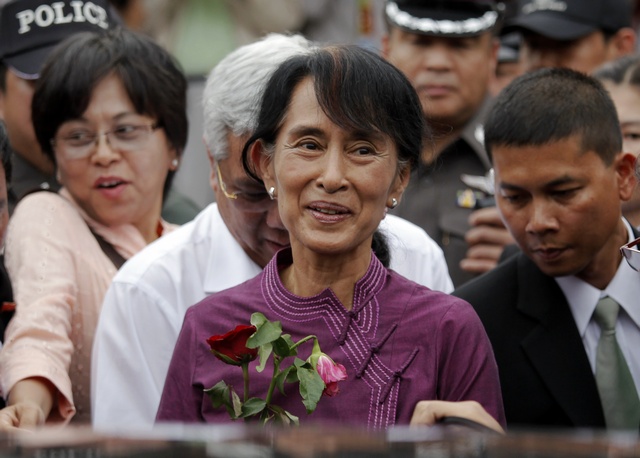Thousands of Burmese migrant workers are eagerly awaiting the visit of their democratic icon and national hero Aung San Suu Kyi in the coastal fishery centre of Samut Sakhon on Thursday.
The state counsellor, who begins her three-day visit to Thailand with a visit to see her compatriots who make a living doing dirty and dangerous jobs in Thailand, is to be welcomed with folk music and dances as well as tough questions about the Rohingya people.
Many Burmese workers have high hopes that Suu Kyi can bring about effective reforms in the country and tackle discrimination so they can return to their homeland and live a better life.
“If I have a chance to see her [Suu Kyi], I will ask her why our country cannot let the Rohingya have normal lives there,” said Mae Ngea Htwe, 25, a Burmese worker at a grocery store in Samut Sakhon’s Mahachai District, also known as Thailand’s “Little Burma”.
The Rohingya, a Muslim minority largely based in Arakan State, have not been accepted as citizens of Burma and have been persecuted by the state, prompting communal violence, forcing many to flee the country at the mercy of human traffickers. The resulting refugee crisis has reverberated throughout the region.
“Regardless of our differences, I consider Rohingya as Burmese people. I just wonder why we cannot let them live in our country peacefully,” said Mae Ngea Htwe, who comes from Kayan Township in Rangoon Division and entered Thailand in 2012 across the border at Kanchanaburi.
Suu Kyi, who has become de facto national leader and was made foreign minister in April, will arrive in Bangkok with her delegation including the Minister of Labour, Immigration and Population Thein Swe, Finance Minister Kyaw Win and Deputy Minister for Foreign Affairs Kyaw Tin.
Issues related to illegal Burmese migrants will be raised for discussion during her meeting with Thai government officials, while the plight of refugees has disappeared from the agenda.
On the evening of her arrival, Suu Kyi is scheduled to visit the Talay Thai fishing and seafood market in Samut Sakhon where she will meet about 500 Burmese migrant workers.
Approximately, 5,000-6,000 Burmese migrants are expected to arrive at the market hall to welcome their leader. Migrant and civic groups in Samut Sakhon are preparing the venues with traditional music and folk dances.
However, Prime Minister Prayut Chan-o-cha said on Tuesday that the Rohingya are a sensitive issue for Burma and the Thai government would not interfere in the internal affairs of its neighbouring country. However, Thailand is ready to support Burma in solving any problems and the government has assured it will care of Burmese workers in Thailand properly.
According to the Samut Sakhon-based Labour Rights Promotion Network Foundation, there are up to 400,000 migrants working in the fishery-related industry in the province, of whom 90 percent are from Burma and roughly half work illegally. An estimated 4-5 million migrant workers live in Thailand, of whom less than 3 million work legally. Burmese people make up more than 80 percent of the total number of migrant workers in the country.
Apart from the plight of the Rohingya, which concerned some Burmese migrant workers here, Lamy, 35, a seafood seller at the Mahachai seafood market who comes from Myawaddy and has lived in Thailand for 10 years, called on the new Burmese government to push forward seriously with national reforms so he could earn a better living in his motherland before he dies.
“If Burma becomes more stable politically and economically, I will surely go back and work in my hometown,” he said, admitting he was extorted now and then by the local police in Mahachai even though he shows them his legal work permit.
“Even though we [migrant workers] carry legal documents, the local police will somehow extort money from us, especially from male workers,” he added.
Sormonai, a Burmese Prathom 2 (Grade 2) student at Wat Kampra School in Samut Sakhon, where 300 Burmese and minority children receive an education, said he would beg Suu Kyi not to bring him back to Burma.
[related]
“I have heard news that she would encourage Burmese people living in Thailand to return home, but I do not want to go back. I get along with my friends and teachers very well here,” he said.
Asked what he wanted to see for the future in his own country if he had to return, he replied, “peace and harmony”.
Preecha Sirisaeng-aramphi, president of the Samut Sakhon chamber of commerce, believes Suu Kyi’s visit to Thailand aims to seek closer cooperation on trade and investment, rather than encourage Burmese workers to return home.



